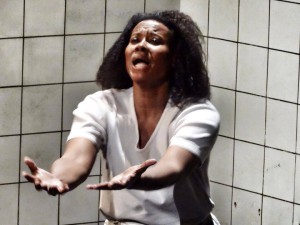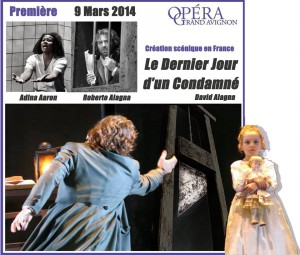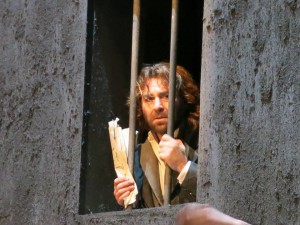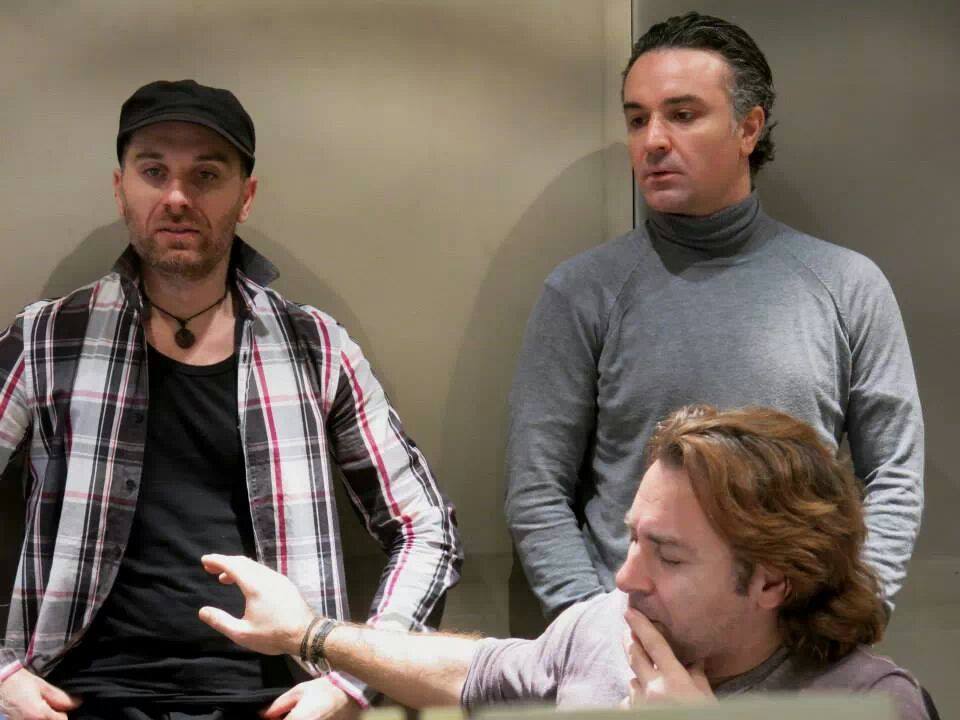Interview to Frédérico Alagna by Natalia DiBartolo. Translated from the original by Natalia DiBartolo.
 Standing Ovation at the Opéra Grand Avignon on Sunday, March 9, 2014. An extraordinary success for an extraordinary event: the first French staging of the Opera “Le dernier jour d’un condamné” by the Alagna Brothers: Roberto’s brainchild, libretto by Frédérico, and music by David, based upon the famous novel by Victor Hugo: three brothers united in life and in art have given an extraordinary Work to the scenes, from a French Literature masterpiece.
Standing Ovation at the Opéra Grand Avignon on Sunday, March 9, 2014. An extraordinary success for an extraordinary event: the first French staging of the Opera “Le dernier jour d’un condamné” by the Alagna Brothers: Roberto’s brainchild, libretto by Frédérico, and music by David, based upon the famous novel by Victor Hugo: three brothers united in life and in art have given an extraordinary Work to the scenes, from a French Literature masterpiece.
In the role of Condamné, Roberto Alagna, indisputable and undisputed star, flanked by the beautiful Adina Aaron, his feminine alter ego in the Opera, and many other excellent performers. Orchestre Régional Avignon – Provence, directed by Maestro Balàzs Kocsar, the choir of the Opéra Grand Avignon l’Opéra de Tours directed by Aurore Marchand, stage directed by Nadine Duffaut, with Emmanuelle Favre’s scenography, costumes by Katia Duflot, and lighting by Philippe Grosperrin.
Written in 1828, Hugo’s novel is a milestone in the history of literature that relates to the fight against the death penalty, more than ever in the modern theme, even today. It was an extraordinary idea to turn such a great novel into Opera; it came from a very strong inner and heartfelt urge, making it extremely engaging.
I have the privilege to talk about it, especially from the literary point of view, with Frédérico Alagna, sculptor, painter and graphic artist, poet and musician, name of art Fra Delrico, author of the libretto and present in the audience in the Avignon’s parterre as well as on the stage for the countless calls of the public at the end of the lyric performance.
 L’IDEA: Fréderico, I saw you smiling and satisfied. I am glad and I congratulate you and your extraordinary brothers. How and when did you have the idea to compose this work?
L’IDEA: Fréderico, I saw you smiling and satisfied. I am glad and I congratulate you and your extraordinary brothers. How and when did you have the idea to compose this work?
Frédérico Alagna: Thank you for your interest: I had not yet had the opportunity to give my personal point of view, because I’ve been busy away from Avignon for my work, since they started the rehearsal until the premiere, which was, therefore, a nice surprise even for me, because I “discovered” the show directly “with” and “just like” the public.
To answer your question, we three brothers have always had the desire to create an Opera, because it is an art form that has given us so much: we three wanted to give something to Opera. Now it is done and we are happy.
L’IDEA: What prompted you to get so involved in this job?
Frédérico Alagna: With Roberto and David, but especially with David, we talk about everything since when we were kids. I have always worked together with him and it was natural to create this work in literature and music, as well as many other works that we have carved, painted or written together, always in the family home. We found the Condamné’s subject so important that we started working with heart and soul in the project.
L’IDEA: It is truly a family made of artists yours! How have you managed the project, along with your brothers and made it a reality?
Frédérico Alagna: Little by little, one by one, we found our role. Rob gave us the idea, I have made the most from the novel by Hugo, without changing a word written by him, and David began to write the music. We thought that we would write music together as always (we have written several songs and lieder together before the Condamné), but David felt so identified with the work that we decided that he alone would have been the composer. I therefore dedicated myself to write the libretto; meanwhile I was continuing to work on paintings and sculptures.
L’IDEA: According to what dramaturgical criteria did you turn the novel into a libretto? Why did you choose to keep unchanged the prose of Hugo?
Frédérico Alagna: Like everything else, it was a choice of all three of us, because we had an almost religious respect for Hugo at the time (we are talking about 15 years ago, almost); but even now it would not be any different.
L’IDEA: The work of Hugo is a literary masterpiece, also made up of shades and chiaroscuro, memories, descriptions and stories. Why was it trimmed and changed into a work in strong colors, in which all that is external to the cell and the microcosm of the convicted person has been excluded?
Frédérico Alagna: Nothing essential has been ruled out; we removed only the scenes a bit too ” melodramatic ” that were not helpful to the unfolding of the drama or that did not correspond to our musical or dramaturgical taste.
L’IDEA: What prompted you to give this libretto such cutting introspective, choosing what you did and removing what was not used?
Frédérico Alagna: This exclusion was decided by David: I have taken everything from the text that you could use for a play from a book. I wanted to give David the maximum, so that he, according to his musical inspiration or necessity, could remove and choose what he liked. With my full libretto, the work would last 4 hours!
 L’IDEA: Was it your idea to introduce the African-American woman, doubling up the condemned? Why did you decide this step, which is central to the distribution of the parts from one character to two, settled in two different eras?
L’IDEA: Was it your idea to introduce the African-American woman, doubling up the condemned? Why did you decide this step, which is central to the distribution of the parts from one character to two, settled in two different eras?
Frédérico Alagna: No, the idea was not mine, but it was a great idea by David. The main reasons are threefold.
First, a singer just could not sing the part of condamné: too ponderous. Second, with this female character, the musical score becomes richer and more colorful, with new shades. Third, this character is transmitted with a current message, because many countries have not yet ceased to condemn humans.
L’IDEA: How is the religious element, represented by the presence of Ministers and prayer, seen and why?
Frédérico Alagna: This is a part a bit special in Hugo’s novel: here the author wants to make clear that, sometimes, even the men in the service of God are just like other men, with the same weaknesses in which we can identify all us sinners. The spirit of the novel was also here absolutely respected.
L’IDEA: Are you still satisfied with your work and the overall result of the Opera? How are you feeling today about that experience? Would you write again as you have written or would you change anything? And if so, what?
Frédérico Alagna: Yes, I’m happy with what I have achieved and I can also say that I would not change anything about the job that I gave David to make his own choices. I still think that to keep all the book in the words of Hugo was the right option.
L’IDEA: What were your projects when you completed the Work? Representing it and then …maybe record it? Your projects have materialized?
Frédérico Alagna: Yes … and everything today has materialized. We are very happy, because we are all three self-taught. We wanted and we want our work to be considered like all the other works that we love in the operatic repertoire, from Monteverdi to contemporary composers. The future will tell if our work has deserved and got this result.
L’IDEA: What do you like most in this latest production at the Opéra Grand Avignon ?
Frédérico Alagna: The director Nadine Duffaut and her team have done an excellent job, in the spirit of the work, as we want. I especially loved the idea of making the final passage of each condemned in the time period of the other one. So the differences of time and mentality against the death penalty are annulled.
L’IDEA: It’s true: we all loved it; and the future? Maybe a project of direction of the Opera with Roberto and David ?
Frédérico Alagna: Who knows…
 L’IDEA: So, are you planning to repeat the musical experience in the future or do you prefer to dedicate yourself to the visual arts? Among other things, you’re the author of the beautiful poster of the Opera on stage in Avignon, with a painting from your own series “Omertà .”
L’IDEA: So, are you planning to repeat the musical experience in the future or do you prefer to dedicate yourself to the visual arts? Among other things, you’re the author of the beautiful poster of the Opera on stage in Avignon, with a painting from your own series “Omertà .”
Frédérico Alagna: Yes, it was the Opera Grand Avignon to choose one of my paintings from the series entitled “Omertà” (conspiracy of silence). I also created the original artwork for the Opera in Paris, given in the form of concert, and also one for the CD recorded for Deutsche Grammophon. I feel first a painter – sculptor – composer , I do not know if I’ll do other operatic jobs. Today I love the abstract: telling a story is not the thing I love the most; a picture says so much without telling anything at times, and it is the path that I follow. But we’ll see … I have so many ideas that I do not want to stop at a single style.
L’IDEA: Any personal projects of Frédérico as an artist?
Frédérico Alagna: Many, many projects, even those … Well, to have a clearer idea, better do another interview to Fra Delrico, won’t you? Thank you for your questions.
L’IDEA: We’ll interview you again with much joy ! Thank you, Frédérico, for your answers, but above all for your valuable work for the Condamné and the Art of the Opera.
…Unforgettable moments that remain on the scene in time, but above all in the mind and heart of the spectators.







